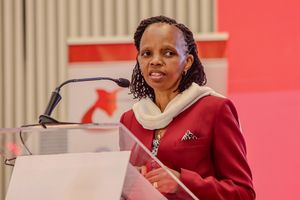Sudi, Karauri, Arama among 15 MPs who've not uttered a word in Parliament for one year

From left: MPs Samuel Arama (Nakuru Town West), Ronald Karauri (Kasarani) and Oscar Sudi (Kapseret).
They are active at religious meetings, rallies and press conferences, but their silence in Parliament, where they represent their constituents, is deafening.
According to the first scorecard for the 13th Parliament released by the Mzalendo Trust Executive, a year after Kenyans went to the polls, 15 MPs have not uttered a word on the floor of the House for a year, some of whom were featured in previous scorecards for the 12th Parliament.
They include Oscar Sudi (Kapseret), George Aladwa (Makadara) and Samuel Arama (Nakuru Town West).
Members who are yet to make their maiden speeches in the National Assembly include Ronald Karauri (Kasarani), Mohamed Soud (Mvita), Paul Chebor (Rongai), Ernest Kagesi (Vihiga), Joseph Iraya (nominated), Teresia Wanjiru (nominated), Elizabeth Kailemia (Meru Woman MP) and Muthoni Marubu (Lamu Woman MP).
Contributing little substance
According to the Mzalendo Trust, the results show a continuing trend of a third of MPs contributing little substance to debates in parliament.
On average, an MP spoke 10 times but 187 members of the National Assembly spoke less than 10 times (68.14 per cent).
On average, a member of the Senate spoke 41 times.
Only one senator spoke less than 10 times, while the majority spoke 50 times or more in plenary.
The most active members of the National Assembly were Dr Makali Mulu (Kitui Central), Beatrice Elachi (Dagoretti North), James Nyikal (Seme) and Ken Chonga (Kilifi South).
Among the issues they raised were food security, drought and environmental protection.
In the Senate, the main contributors were Samson Cherargei (Nandi), Eddy Oketch (Migori), John Kinyua (Laikipia) and Mohamed Faki (Mombasa).
Learners with disabilities
Some of the issues they raised touched on land historical injustices, mental health and education for learners with disabilities.
During this period, key areas of concern for Kenyans were high cost of living, high unemployment, prolonged drought, insecurity, the Shakahola massacre, energy costs, the implementation of the Competency-Based Curriculum (CBC), public debt, sexual abuse in the workplace, welfare of migrant workers, state of health care and NHIF, food security, police brutality, climate concerns, state of mental health and land issues.
The report shows that Parliament's priorities have been at odds with citizens' expectations over the past year.
“There has been a mismatch between citizens’ expectations and Parliament’s actions. Whereas citizens have invested heavily in public participation, the results have not been reflected in the most anticipated legislative proposals,” said Mzalendo Trust Executive Director, Caroline Gaita.
Did not heed Kenyans’ calls
“For instance, despite public outcry on the high cost of living, members of the National Assembly did not heed Kenyans’ calls to reject certain punitive clauses of the Finance Bill, 2023. The exercise was marred by political chicanery and sharp partisan positions that obscured objectivity in debating the proposals of the Bill.”
Ms Gaita urged lawmakers to rise to the occasion and ensure that the legislative agenda of the 13th Parliament reflects the expectations of Kenyans.
“This can be done by entrenching public participation, and ensuring it is not a mere procedural technicality,” she said.
The Parliamentary Watchdog has been publishing the scorecard since 2014, usually rating each MP's participation in parliamentary sessions, noting the number of times MPs have made a speech in parliament or contributed to parliamentary debates.




